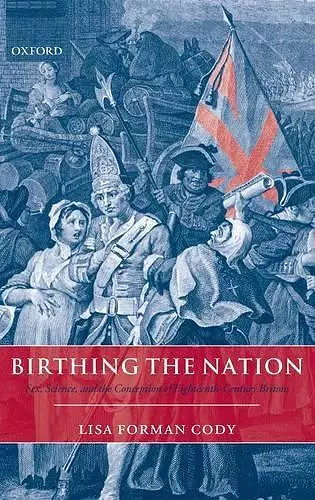Birthing the Nation
Sex, Science, and the Conception of Eighteenth-Century Britons
Format:Paperback
Publisher:Oxford University Press
Published:17th Jul '08
Currently unavailable, and unfortunately no date known when it will be back
This paperback is available in another edition too:
- Hardback£187.50(9780199268641)

How could the professional triumph of man-midwifery and contemporary tales of pregnant men, rabbit-breeding mothers, and meddling midwives in eighteenth-century Britain help construct the emergence of modern corporate and individual identities? By uncovering long-lost tales and artefacts about sexuality, birth, and popular culture, Lisa Forman Cody argues that Enlightenment Britons understood themselves and their relationship to others through their experiences and beliefs about the reproductive body. Birthing the Nation traces two intertwined narratives that shaped eighteenth-century British life: the development of the modern British nation, and the emergence of the male expert as the pre-eminent authority over matters of sexual behaviour, reproduction, and childbirth. By taking seriously contemporary caricatures, jokes, and rumours that used gender, birth, and family to make claims about religious, ethnic and national identity, Cody illuminates an entirely new view of the eighteenth-century public sphere as focused on the bodily and the bizarre. In a monarchy arbitrated by its official religion, regulation of reproduction and childbirth was vital to the very stability of British political authority and the coherence of British culture, challenged as it was by Catholicism, the French Revolution, and social change. In the late seventeenth century, the English feared the power of female midwives to control the destiny of the royal family, yet men-midwives and male experts had hardly proved their superiority to manage the successful birth of children. By the mid-eighteenth century, however, male midwives became experts over the domestic world of pregnancy and childbirth, largely replacing female midwives among the middling and elite families. Cody suggests that these new professionals provided a new model for masculine comportment and emergent intimate relationships within the middle-class and elite home. Most surprisingly, Cody has discovered many interconnections between obstetrics and politics, and shows how male experts transformed what had once been the private, feminine domain of birth and midwifery into topics of public importance and universal interest, leading even Adam Smith and Edmund Burke to attend lectures on obstetrical anatomy. This is the first book to place the eighteenth-century shift from female midwives to male midwives as the dominant experts over childbirth in a larger cultural and political context. Cody illuminates how eighteenth-century Britons understood and symbolized political, national, and religious affiliation through the experiences of the body, sex, and...
Review from previous edition Cody's most important achievement is to show that birth is a tool for historical analysis, a tool which brings to light struggles over issues as key as gender relations, national identity, racism and the growth of the modern state. * Berkshire Conference of Women Historians, Book Prize Committee *
Cody straddles some of the most significant and distinctive themes of the long eighteenth century ... [she] teases out a novel interpretation of a well-rehearsed medical development, and presents it in a way which cannot help but have impact on the reader. * Alysa Levene, Reviews in History *
- Winner of Winner of the 2005 Berkshire Conference of Women Historians First Book Prize Winner of the Sierra Prize of the Western Association of Women Historians 2005 Winner of the Phi Alpha Theta History Honor Society Best First Book Award Shortlisted for The Whitfield Book Prize 2005.
ISBN: 9780199541409
Dimensions: 234mm x 156mm x 22mm
Weight: 566g
376 pages